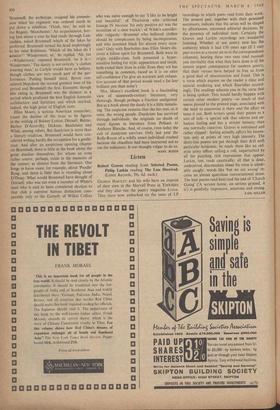Lis ten Robert Graves reading from Selected Poems, Philip Larkin
reading The Less Deceived. (Listen Records, 39s. 6d. each.) GEORGE HARTLEY and his wife have an imprint of their own in the Marvell Press in Yorkshire and they also run the poetry magazine Listen. They have now embarked on the issue of LP recordings in which poets read from their work. The present pair, together with their promised successors, indicate that the series will be shaped by affectionate, interested editorial decisions, by the presence of individual taste. Certainly the Graves and Larkin recordings are . wonderful listening. Whether or not poetry now has the authority which it had 150 years ago (if I may peer across at a recent set-to in the correspondence columns), hearing these two men read reminds you inevitably that what they have done is of the utmost urgent consequence for modern poetry, that their virtues have helped to free us from a good deal of obscurantism and fraud. This is a verse which enjoins on the reader a clear and natural rendering and which flourishes accord- ingly. The readings educate you in the verse that is being spoken. This would hardly happen with certain other modern poetry—so much of that seems pinned to the printed page, associated with the need to anatomise it there and the effort to tease it out. Both writers speak their poems as a sort of talk—a special talk that adorns and en- hances feeling and has a stricter honesty than one normally contrives. Graves is restrained and rather clipped : feeling actually afflicts his intona- tion only at points of very high intensity. The short-line poems are put through their drill with particular briskness; he reads them like an old- style army officer calling a roll, unperturbed by all the puzzling, rich expressions that appear. Larkin, too, reads caustically; all that is dour, undeceived, disconsolate about his verse is admir- ably caught; words like 'but we are wrong' re- ceive an almost querulous conversational stress. The best poems read best, and the end of 'Church Going' CA serious house, on serious ground, it is') is painfully lnipressive, sonorous and strong.
KARL MILLER


































 Previous page
Previous page